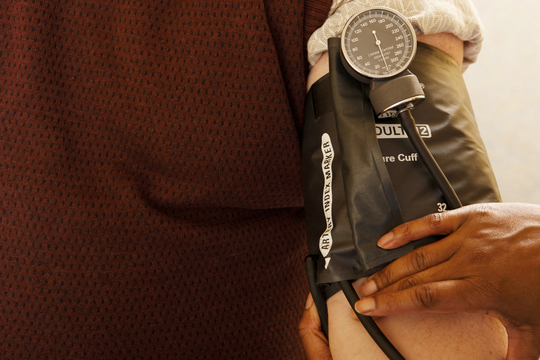Guest blogger Joel Sigler is senior manager for Kaiser Permanente National Environmental, Health & Safety
The Center for Total Health has a self- service health assessment machine that provides visitors a printed receipt indicating their weight and body mass index (BMI). Recently, a visitor asked a great question about whether the receipt paper is coated with Bisphenol A (BPA).
BPA is an endocrine disrupter that mimics estrogen in the body. Studies have found that BPA exposure is potentially linked to a number of health concerns including breast cancer, diabetes, heart disease, sexual dysfunction, and obesity (kind of ironic if present in a machine that tells you your BMI). There are many sources of BPA exposure, it is found in many products including food can linings and plastic bottles. Unfortunately, receipt paper is one of the many items that can also potentially contain BPA. Receipt paper is of particular concern because it can easily be absorbed into the body when the receipt is handled. Absorption of BPA is sped up even more if hand sanitizer has been applied before handling a receipt.

We promptly called the manufacturer of the self-service health assessment machine to find out if they knew if the receipt paper contained BPA. The good news is that the manufacturer was very responsive. Within a day they had contacted their receipt paper supplier and verified that it was “BPA free.” They even provided KP a letter from the receipt paper supplier. Kaiser Permanente is continuing to communicate with them to find out about any BPA alternatives that they may be using. Bisphenol S (BPS) and Bisphenol F (BPF) are chemicals commonly used as substitutes for BPA. They are less studied than BPA and haven’t gotten the same attention. But because BPS and BPF are similar in chemical structure to BPA, experts have concern that they could represent similar health risks.
It is important to recognize that product manufacturers aren’t always this responsive. It often takes a lot of effort to get an answer to whether a product contains chemicals of concern, either because they don’t know, or because they don’t think it is important enough to find out. In this case, the question had gotten to the President of the manufacturing company and apparently he had gotten similar questions from other customers. So just asking the question helps drive action. It is unfortunate though that when it comes to chemicals of concern, the onus is on the customer/consumer (and not on manufacturers) to drive efforts to find out if a product is “safe.” Kaiser Permanente puts significant effort into identifying and eliminating chemicals of concern like BPA in the products that the organization purchases and uses.
The Environmental Working Group provides the following recommendations to reduce exposure to BPA from receipt paper:
-Minimize receipt collection by declining receipts at gas pumps, ATMs and other machines when possible.
-Store receipts separately in an envelope in a wallet or purse.
-Never give a child a receipt to hold or play with.
-After handling a receipt, wash hands before preparing and eating food (a universally recommended practice even for those who have not handled receipts).
-Do not use alcohol-based hand cleaners after handling receipts.
-Take advantage of store services that email or archive paperless purchase records.
-Do not recycle receipts and other thermal paper. BPA residues from receipts will contaminate recycled paper.
More information on all of Kaiser Permanente’s environmental stewardship program can be found at kp.org/green




